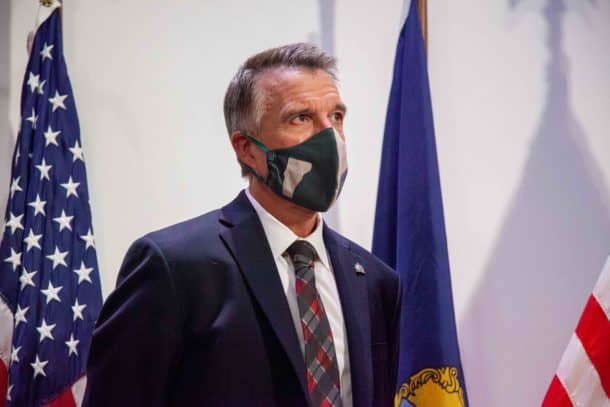
Gov. Phil Scott on Friday issued an order requiring people in Vermont to cover their faces when out in public, saying that while Vermont’s Covid-19 infection rate is still among the lowest in the country, a rise in cases elsewhere in the U.S. has put Vermont on the defense.
Scott has long resisted a mandate, saying that education is the best way to get people to wear masks when in public. Thirty-one states and the District of Columbia now require most people to cover their faces when out in public, according to the AARP.
But on Friday, Scott noted that cases are still surging elsewhere in the U.S., including in states like Florida. Florida has 400,000 cases of coronavirus; 173 people died in that state of the virus yesterday, according to the Florida Department of Health.
“With our low numbers and other considerations, I have waited to implement a mask mandate thus far,” Scott said. “I preferred to focus on education, helping Vermonters understand why they should wear a mask, which is to protect their neighbors and themselves and keep Vermont open so they could make the right choice on their own.
“I still believe that has been the right approach to date, but looking at the situation in the South and West and knowing we’ll have more people coming to Vermont, and more Vermonters inside as the weather gets colder, we need to be sure we’re protecting the gains we’ve made.”
Starting Aug. 1, masks will be required of anyone over the age of 2, unless the person has a physical or developmental disability that would be complicated by the wearing of one. Businesses will be permitted to decline serving customers who don’t wear masks. Masks will be required outdoors if it’s impossible to keep a distance of 6 feet from others. Scott said there was an exception in the case of strenuous exercise.
People who decline to wear a mask because of health concerns will not be required to produce documentation.
“Doing so would clearly be a violation of their healthcare privacy rights,” Scott said.
Violators won’t be penalized; Scott said that the state is relying on education for enforcement. “We haven’t put a fine structure in place at this point in time,” he said, though he noted that could be implemented later.
Scott said the state’s Covid-19 case modeling this week had pushed him to make the mask decision. Among other things, thousands of college students are expected to move to Vermont from around the country in the middle of next month.
Mike Pieciak, commissioner of the Vermont Department of Financial Regulation, said the country has recently hit 4 million cases, a benchmark that shows the virus’ staggering toll — and also its growth in recent weeks.
The United States took 15 days to go from 3 million to 4 million cases, compared to 99 days to get its first 1 million cases, said Pieciak, who presented the state’s latest modelling.
That growth is focused in the South and West, but even within our region, “the rise in new cases has become a trend,” he said.
“It’s not the explosive growth other states have been experiencing, but new cases are approximately 20% higher this week than they were for the last week of June, which should give us some pause here in Vermont,” he said.
Nationally, mask mandates vary widely, but most require masks in indoor spaces such as stores and restaurants, and outdoors when within six feet of others, the AARP said. Most include exceptions for people who have medical conditions that prevent them from wearing masks.
Until now, Vermont and New Hampshire had been outliers in the Northeast, surrounded by states with mandates. Scott had been under pressure for weeks from constituents on both sides of the mask mandate question, which generally falls along political lines in Vermont and in the rest of the U.S.
Democrats running for state offices had called for a mandate. Many Vermont cities and towns had passed their own mask ordinances. And the state weeks ago set out mask requirements as part of safety rules for business to reopen.
Scott acknowledged that the issue of masks has been personalized on social media and politicized. He asked Vermonters to look at the science and the data that show masks can reduce the Covid-19 infection rate.
“Look at the data, the real data; realize the science is real, “ Scott said. “Wearing a mask will protect the gains we have made.”
And as he has since declaring a state of emergency in March, Scott emphasized that Vermont will fare best in the pandemic through personal responsibility, not mandates.
“To those of you already wearing masks, that are concerned about those who aren’t: I ask you to give them the benefit of the doubt. Attacking, shaming, and judging isn’t going to help, but understanding, educating, meeting people where they are, and maybe using a little kindness and understanding might.
“Let’s not make the news with screaming matches caught on video; let’s do things the Vermont way by being role models and leading by example.”



